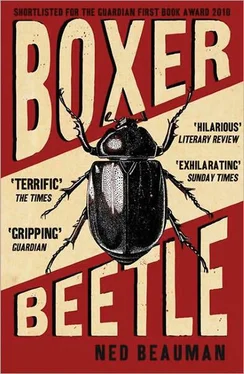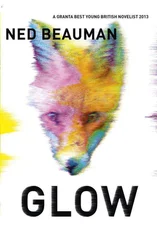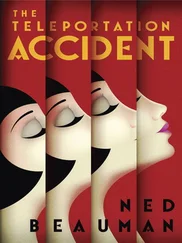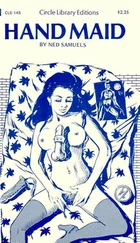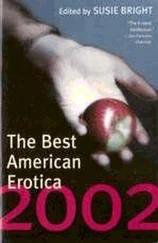‘What is it?’ he said, taking the card from Morton and reading it over.
Erskine didn’t understand — it seemed to be just an advertisement for a nightclub — but he forced a little laugh anyway, and gave it back. He sat for a few minutes as the three others began to joke about the temperaments of some of their university contemporaries. But as he tried to think of something witty to contribute, he slowly began to realise what they were really discussing, and at last, when Cripling used the expression ‘a bunch of brown hatters’, Erskine was sure. After that, he listened very closely.
But by then the theme was already almost exhausted, and the others soon started to talk about their plans for the evening. As much as he’d heard about the wonderful freedoms of a young bachelor in London, Erskine had found that one’s movements were even more public in a little club like this than they had been in a Cambridge college, so he already had an imaginary dinner with a cousin prepared as an excuse for going out to the fight tonight. And when the other three got up, leaving the card behind, he realised nervously that the excuse could do double-duty. Shaftesbury Avenue was only a few minutes from the United Universities Club. He could easily slip into this Caravan place on the way back from the fight.
In Trinity’s Great Hall he had once overheard part of a conversation along similar lines about a pub called the Marquis of Granby. Then, as now, he had carefully committed the exchange to memory, but it had contained no details of scientific usefulness apart from one crucial remark that ‘at a place like that, one can never be over-dressed’. Erskine consequently concluded that he would have to put on white tie if he was to visit the Caravan, but he could hardly wear that to the boxing match. Luckily, he had already resolved to wear his father’s overcoat on his trip into Spitalfields and keep it on at all times so that he wouldn’t have to come back to Suffolk Street with the ineradicable stench of blood and poverty and herring and Jew on his suit. The tails would not be visible under the overcoat.
He spent the early evening finishing a book by Lord Alfred Douglas called Plain English . Douglas, like Erskine, had been in the scholars’ house at Winchester, and Erskine had spent a term working at a desk on which the small carving of an erect penis was reportedly Douglas’ work. What Erskine had read of Wilde and his panderers he found repellent, but when he discovered that ‘Bosie’ had written a book about racial purity he ordered it from the London Library out of curiosity. As he’d expected, it was a crude work, with nothing to say, for instance, about Pitt-Rivers’ interesting but outlandish theory that, in sexual inversion, the great evolutionary consciousness of the species had found a way of hacking off its own least promising lines of inheritance before they could be propagated. Also, the book apparently lacked any of the coded allusions to immorality that Erskine sometimes found it abstractly amusing to identify in works by authors like Douglas, mentally netting and labelling each innuendo like a butterfly.
He ate steak and kidney pie at the club, changed into white tie, put on his gloves, buttoned his overcoat, and then, armoured, took a cab to Premierland. Commercial Road swarmed. The cab nearly ran over an organ-grinder’s monkey pulling at its chain. He’d heard that Thomas Cook took tourists on sightseeing tours of the exotic East End. To Erskine, the urban poor seemed not much different from the rural poor, and he understood neither. Why must they be so ugly and sore-ridden, he wondered? Why must they scream at their own children? Why must they urinate in the street? Plainly no one could desire these indignities for their own sake, so they made sense only as a sort of deliberate, spiteful impudence. On an intellectual level he understood that the condition of these specimens was the result of degenerative miscegenation and insufficient selection pressure, but still, somehow, as the son of Celia Erskine, a well-known charitable benefactor, he couldn’t help feeling personally insulted by their obvious lack of gratitude. Had Marx really spent all that time in London? Surely he must have realised that, if these withered grey creatures tried to rise up, the result would be unpleasant but barely perceptible, like a gust of smoke from a grate in the street.
The match was sold out, so he bought a ticket at four times the original price from a tout in a wheelchair, and found a seat. He looked around. The lights above the ring were enclosed in a black square shade printed with advertisements for an evening paper, and around the ropes were hung red and blue posters with the programme for next week’s fight. Although the smelly man next to him kept jostling his shoulder, he felt secure in his overcoat. It wasn’t like the theatre — the audience came and went and talked and whistled and drank and even, somehow, slept as they pleased, and boys climbed from row to row shouting, ‘Nice apples, twopence’ — but then Erskine himself didn’t pay much attention to the first two fights. Instead, he looked around for anecdotal observations that he could one day include in a work on eugenics: a charming blonde Anglo-Saxon girl on the arm of some warty, toadlike Semite, for instance. Before Erskine had found anything of the sort, however, it was time for Roach vs Pock.
Erskine had first come across Seth ‘Sinner’ Roach in a copy of Boxing that was lying around in the coffee room of his club. Reading Sinner’s statistics and looking at his picture, Erskine had been struck by two powerful blows. The first was the very idea that such exquisite sporting prowess could have emerged from a physiological inheritance that was otherwise so wretched, like a peach tree growing from a plague pit — Jewish boxers were not uncommon these days, but what about an awkward, five-foot, nine-toed Jewish boxer who was good enough to be a world champion? The second blow was irritatingly obscure — like knowing you have forgotten something and not knowing what — but Erskine did not have time to pursue it because the case of Seth Roach had helped towards maturity one or two heretical ideas that he was nursing about practical eugenics, and soon he concluded that a close observation of Sinner would be the best way to put them to the test. He took out a subscription to Boxing , and when one of Sinner’s matches coincided with a visit to London he was determined to attend.
The fight was thrilling. Both fighters glowed like medieval saints. Unlike many sportsmen Erskine had seen, Sinner seemed to take no satisfaction in his own speed and grace and power — they were too much a part of him — he was like a fox or a deer, any creature that is more beautiful because it cannot know it is beautiful, any creature with the courage to contend that the world does not carry on while it is asleep. Hitler had said that ‘the German boy of the future must be lithe and slender, swift as a greyhound, tough as leather, and hard as Krupp steel’. Sinner was all that. Hitler hadn’t said anything about tall.
And there was something so intimate about these near-naked men fighting their very hardest — Erskine almost wanted to turn away in embarrassment, but he was too rapt. Soon the cheers of the crowd seemed to fall away, and he could hear nothing but the butcher’s-counter slap of fist on face.
Then it ended. Erskine was as disappointed as anyone by the sheer cowardice of Pock, who by that point was wet and blinking like someone who hadn’t quite saved his dog from drowning in a river. During the ensuing dispute over the foul, Erskine remembered that a match like this was played by Marquess of Queensberry rules, and wasn’t that Lord Alfred Douglas’ father, sued by Wilde for calling him, illiterately, a ‘somdomite’? Except he wasn’t sure if it was the same Marquess of Queensberry. When Sinner knocked Pock out of the ring, he found himself screaming with joy. He’d wanted Sinner to win so much.
Читать дальше
